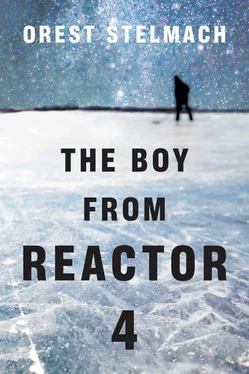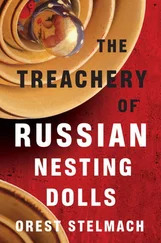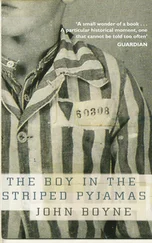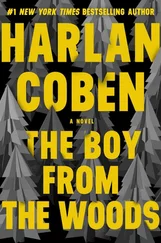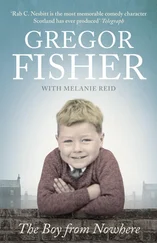“Hotel Rus. How much?” Nadia said in English. She rubbed her fingers together in the international sign for money.
He put up four fingers and answered in Ukrainian. “Four hundred hryvnia,” he said. Fifty dollars. Should be closer to thirty , Nadia thought.
Nadia switched to Ukrainian. “I need an honest Hetman. One who’ll take this Cossack’s daughter to her hotel for two hundred hryvnia.”
His lips formed the trace of a smile. “I’m cutting the line. Big violation if they notice. But for a Cossack’s daughter returning to her homeland from America, three hundred hryvnia.”
Nadia stepped back. “How did you know I’m from America?”
He pointed at the KLM baggage tag on her suitcase. “Newark, New Jersey,” he said in broken English, smiling.
Nadia agreed to his rate. He took her bags, opened the door for her, and drove her out of the airport.
“First time here?” he said.
“Yes.”
“Are you a language professor? An academic?”
“No. I was born in America, but I was raised in a Ukrainian community. Ukrainian was the first language I learned. I went to night school for twelve years.”
“You speak it well. Where was your father from?”
“Bila Tserkva.”
The driver nodded. “Sure. My cousins live there. I visit all the time. What do you do for a living in America?”
Nadia hesitated. “Finance,” she said. “I work in finance.”
He moaned with approval. “So you are beautiful, and you make a good salary. You are half of paradise.”
Nadia blushed. She spied his handsome grin in the rearview mirror. “I beg your pardon?”
“In Ukraine, men say that paradise is an American salary, a Ukrainian wife, Chinese food, and an English house. You have the first two covered, so you’re half of paradise.”
“Oh.”
He glanced at her through the mirror. “You know what hell is?”
Nadia shook her head.
“Hell is a Ukrainian salary, an American wife, a Chinese house, and English food.”
Nadia chuckled. “Yes. Stay away from those American women. They’re selfish and spoiled.”
“Really? Ha. What do you know? Just like the men in Ukraine. That makes us two of a kind.”
An eight-lane highway cut through a countryside filled with birch groves and white brick farmhouses. A yellow neon sign proclaimed WELCOME TO KYIV in English. The forest yielded to a sequence of billboards and neat rows of apartment buildings topped with satellite dishes. At first, the landscape was reminiscent of the approach to a regional American airport. Once they crossed the Dnipro River and the hills of Kyiv rolled into view, everything changed. A panorama of gilded church domes decorated the horizon. They blended with modern architecture to create a unique urban skyline.
As traffic picked up, the driver accelerated his pace. He used breakdown lanes to pass on the right and darted between cars in lanes that didn’t exist. Nadia clung to her armrest.
“There are no atheists in Kyivan taxicabs,” he said with a grin. “In fact, you give me an atheist, I’ll convert him to the religion of your choice in fifteen minutes.”
“That’s terrific,” Nadia said. “But I’m already a believer. And if I wasn’t clear at the airport, I was hoping to arrive at the hotel alive.”
The driver laughed and drove more cautiously the rest of the way. When he pulled into the driveway, Nadia tipped him 20 percent.
“Here is my card,” he said earnestly. “My name is Anton. If you need reliable transport, call me. Anytime.”
Nadia looked at the card. Anton Medved, Assistant Professor of Sociology, Kyiv Slavonic University . Why was a professor driving a cab?
“Ukrainian salary,” Anton said, as though reading her mind. “It really is hell.”
Nadia thanked him and checked into the Hotel Rus. The drab concrete exterior of the former Soviet property conjured images of a soulless country. Her room was small but clean.
After a quick shower, Nadia dialed Clementine Seelick’s number in Kyiv and got the same beauty salon she and her mother had reached before. She gathered her valuables in her bag and asked the concierge for directions to Clementine’s address. Just in case the taxi driver tried to take her for a ride or she ended up on foot for whatever reason.
In the taxi, she asked the driver if Start Stadium was on the way. He said it was a slight detour. Nadia asked him to drive by so she could see it. He obliged and stopped at a monument at the front. It was a bronze of a muscular athlete kicking a soccer ball into the beak of a wounded eagle. Nadia felt a lump in her throat. She could hear her father tell the story for the umpteenth time.
On August 9, 1942, Kyiv was under Nazi occupation. A group of German officers believed to be members of artillery and Luftwaffe units challenged a local soccer team consisting primarily of bakery employees. Some of those employees, however, had been members of Kyiv’s elite Dynamo team. The local team was warned about the risks of defeating a team consisting of Nazi soldiers, but as one Ukrainian player put it, “Sport is sport.” The game that followed would become known as the Death Match.
Before the match started, a Gestapo officer visited the Ukrainians in their locker room and instructed them to give the Nazi salute in a pregame ceremony. The players agreed, but then refused to follow through on the field. The match was tied 3–3 until the Ukrainians rallied for two more goals. They won 5–3.
Within six months, four of the Ukrainian players died. Among them, their three stars.
Yes, exaggerations followed. The Germans probably didn’t incapacitate the Ukrainian goalie by kicking him in the head. There was no evidence a Gestapo officer warned them to lose at halftime or face execution. It was unclear if the players’ deaths were a function of retribution. And director John Huston’s Victory , with Michael Caine and Sylvester Stallone, where the players earned a victory and escaped to freedom, was pure Hollywood.
But they were legitimate Ukrainian heroes from World War II. A war during which eight million Ukrainians died, more than in any other European country, and one during which Ukrainians were often collectively labeled Nazi sympathizers.
After the detour, the driver turned back and dropped her off on Yaroslaviv Val. It was a narrow, cozy street. Elaborate balustrades and balconies adorned the facades of architectural masterpieces. Nadia walked for five minutes until she found the five-story neoclassical apartment building. She buzzed the door to Seelick, 8B, took a deep breath, and waited.
No one answered.
A minute later, she buzzed again. No one was home. After two more tries, she buzzed the button for deliveries and asked to speak with the super.
A stout man with a handlebar mustache opened the door. Nadia told him she was looking for Clementine Seelick.
The super soured as soon as he heard the name. “She’s gone,” he said.
“Gone?”
“This is a monthly rental. She left at the end of March.”
“Did she leave a forwarding address?”
The super looked Nadia over from head to toe and turned away as though he was insulted. “No. I don’t think she lived here.”
“I don’t understand.”
“She had visitors. Male visitors, if you know what I mean. And now she’s gone. Are you interested in renting an apartment?”
“Who, me?” Nadia said. “No, thank you.”
The super grunted and slammed the door in her face.
CHAPTER 21

KIRILO ANDRE HOISTED himself to his feet, circled his Louis XIV desk, and faced his daughter. He’d been waiting for this moment since the British kid had asked Isabella to marry him. Kirilo clutched the antique music jewelry box.
Читать дальше
